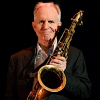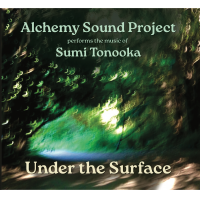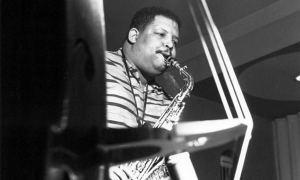Home » Jazz Articles » The Jazzletter » Tenor Saxophonist, Harry Allen
Tenor Saxophonist, Harry Allen
Stan Getz
saxophone, tenor1927 - 1991

Lou Levy
piano1928 - 2001

Al Cohn
saxophone, tenor1925 - 1988
The fulfillment of that ideal may well be embodied in thirty-year-old

Harry Allen
saxophoneb.1966
I discovered Harry Allen last fall on a Caribbean cruise on the S.S. Norway. His records are not easily available. I discovered that we had perhaps met eleven years earlier. One of Harry's saxophone teachers at Rutgers University was the late

Sahib Shihab
woodwinds1925 - 1989
There is a lot of

Zoot Sims
saxophone, tenor1925 - 1985
Zoot was the master of that, Harry said. So was Stan.
Harry's work traces back to pre-Coltrane saxophone. One hears his admiration for Zoot, for Al Cohn, and

Ben Webster
saxophone, tenor1909 - 1973

Paul Gonsalves
saxophone, tenor1920 - 1974
What jazz criticism in general has never understood is that originality as such means nothing. Much of the best music in history was not original. It simply brought to pinnacles of development practices that had gone before. Bach did not begin baroque music; he finished it.
Jazz has now explored its vocabulary, at least all the vocabulary that the audience is likely to follow. Its attempts at an avant-garde will doubtless achieve as much self-sustaining acceptance as that of European music, in which certain music that is now almost a hundred years old still is perceived as radically unlistenable. The question is whether jazz will, having learned its language, use it or will it try to abandon it, as classical music did. At the time of the rise of Arnold Schoenberg, it was widely thought that the European musical tradition was exhausted. Composers since then, including Ravel, Rachmaninoff, Puccini, Giordano, Hindemith, Shostakovitch, Prokofiev, and such Americans as Samuel Barber, Roy Harris, Alan Hovhaness, Aaron Copland, and David Diamond, have proved that it wasn't and isn't.
Jazz is at a crossroads, with one ruminant element manifest in repertory orchestras, its opposite trying to find a new language that actually isn't there to be invented. Harry Allen is one of the young musicians who inspire a cautious hope that jazz may negotiate the waters between Scylla and Charybdis and emerge to use its now-rich vocabulary in original ways. He is already doing it, and each year seems to grow more personal. Certainly more powerful.
This kid is starting to make some real noise, said Jim Czak, the recording engineer and one of the proprietors of the Nola studio in New York, who recorded the most recent Allen album.
No major record company is spending fortunes on publicity for Harry. His career is happening on its own. One reason of course is his sheer excellence. His work is at a far higher level than that of the some of the most powerfully promoted young turks. And then there's his choice of material.

John Lewis
piano1920 - 2001
Harry Allen records standards. This may be because he is (like Lester Young and Ben Webster) partial to singers; he is a particular admirer of Peggy Lee. It is no doubt for this reason that he seems to know all the songs" almost every one of them written before he was born. And whether by design or not, Allen explores a repertoire that the older audience, at least, knows and likes. Interestingly, his close friend John Pizzarelli, who is having great success, does the same. His albums are made up mostly of standards. It is worth reflecting that Rob McConnell built the international success of his Boss Brass on standards.
Harry Allen was born in Washington D.C. on October 12, 1966, the second of two children in the family. His parents moved to Los Angeles when he was a year old and, when he was eleven, to Rhode Island, where they still live. A door-to-door salesman tried to talk his parents into lessons at an accordion studio for his sister, Sally, when she was eight, but not for Harry: at seven, he was considered too young. His father consented to the lessons only on the grounds that both children be given lessons, which they were. Accordion had this advantage: it is a chordal instrument and the exploration of harmony is implicit in learning to play it.
Harry soon began to study clarinet, and then in junior high school switched to tenor. And all the while he was listening to his father's record collection. He was steeped in jazz and the standards before he ever heard rock-and-roll.
I remember my dad would play me records before I went to school, Harry said. My parents were great about music. They didn't push my sister and me into it. But then when we showed a natural interest, they were very supportive. I played soprano, I played a little bit of alto, and then as I went along, I would be playing the clarinet or the soprano, and I would think, 'Boy, I'd rather be playing tenor.' I spend so much aggravation and time trying to get the sound exactly the way I want on tenor. I'd love to play clarinet and really play it well and get the exact sound I want, but there are not enough hours in the day.
I had heard mostly Paul Gonsalves with Duke's band. I just wanted to play tenor. It wasn't really because of any one in particular. But after I started, a tenor player in Rhode Island named Nick Peters told me I should pick up a Scott Hamilton record. I heard that great sound he has and said, `That's what I want to sound like.' Scott Hamilton was the first big influence on me. After that I learned about the guys who went before him. I learned about Zoot and Al and Stan Getz and Ben Webster and Coleman Hawkins and Lester Young and Illinois Jacquet and Flip Phillips.
Harry studied at Rutgers from 1984 to 1988.

Kenny Barron
pianob.1943

Larry Ridley
bassb.1937
The reason I went to Rutgers was to be around New York. I felt, even as a kid, that going to school was not the way to learn how to play music. To be around the guys who were doing it was the way to do it. I felt that if I went to Berklee or one of those schools, I'd be so tied up with music courses that I wouldn't be able to go out and hear the music. I thought that Rutgers would let me go into New York and hang out. And that's exactly what I did. My first year at Rutgers was the last year of

Eddie Condon
guitar1905 - 1973

Illinois Jacquet
saxophone, tenor1922 - 2004
By my junior year in college, I had enough gigs to support myself. When I graduated I kept going the same way I had been going. I went into New York and hung out and tried to get gigs.
In my first year in college, I had already met people like

Scott Hamilton
saxophone, tenorb.1954

Warren Vache
cornetb.1951

John Pizzarelli
guitarb.1960
That he has made fifteen albums leaves Harry unimpressed. He laughed, Most of them are impossible to get. I get good distribution on a record in a certain part of the world. I have done four or five records in England. They get them all over England but nowhere else. I've done some records for the Nagel Hayer company in Germany. They do a good job getting them around Germany but not much anywhere else. The album with John Pizzarelli for BMG has great distribution in Japan. I've never been to Japan, but everybody who goes there tells me the album is on display in all the stores. I've recorded a few for American companies that get some distribution but not total distribution.
John Pizzarelli is selling records. And again, it's not a great wonder why. He swings and he plays great tunes.
Working with Johnny Mandel and a fifty-two piece orchestra on John Pizzarelli's Christmas record has been the musical highlight of my life so far. I've just never heard anything like that. Johnny Mandel is probably my favorite arranger, ever. The opening chord of the piece, What Are You Doing New Year's? was so simple, yet so incredible. I can't even describe it. You listen and it's just a major seventh chord and you think,`Why does it sound so great?' And you hear it over and over again and you realize this alto flute is trilling over there, and something else is doing something different. He plays an orchestra like it's an instrument.
There's a very high importance, and it's ridiculous, placed on being innovative. To an extent quality doesn't really matter; as long as it's innovative, it's going to get attention. Which is really silly. I don't think there's anything out there that is innovative, but there are those who are getting attention as being innovative. And that's a shame. The qualification for the music should be whether it's good or not.
I'm reading Arnold Schoenberg's theory of harmony. When the book was published, about 1911, there were clamorings that it would be necessary to add more notes to the scale because all possible combinations have already been done with the twelve-note system. Schoenberg was saying, `I don't think we have to do that quite yet.' He was just beginning his twelve-tone writing.
There hasn't been much new musical vocabulary since then.
It's important to be inventive. When I was in college, I was the only one who was into

Ben Webster
saxophone, tenor1909 - 1973
I feel very pleased with the way my career has gone so for, considering that I'm not one of the people someone took hold of when they were nineteen and gave a major record contract and management and agent and publicity. There are guys like that around today who are household names and have weeks at the Village Vanguard even before their first record comes out. I didn't go that route. I like to think that whatever I've gotten, it's because people wanted to hear my music.
Since Oliver Jackson took him to Europe, he has enjoyed a steady and growing reputation there. His English recordings, including several on James Campbell's London-based Master Mix label, are not readily available in North America.
An excellent Master Mix album is I'll Never Be the Same, recorded in London in 1992 with only guitarist

Howard Alden
guitar and vocalsb.1958
I am partial to a 1944 album recorded in concert in Hamburg for the Nagel Heyer label. Titled Jazz in Amerika Haus, it has the powerfully propulsive Duffy Jackson on drums, Dennis Irwin on bass, and John Bunch on piano. John is so self-effacing, so willing to erase himself in the accompanist's role, that not too many persons, I think, are aware of what a hot, hip, swinging, imaginative pianist he is. And in this album, you hear it. Indeed, the salient characteristic of this whole album, no small thanks to Duffy Jackson, is its swing.
The latest album, A Little Touch of Harry the title is from "Henry V" is due out in June on the Mastermix label. Harry is heard with the brilliant and consistently overlooked pianist Kenny Barron, his old teacher at Rutgers.
Kenny Barron, Harry said, is such a wonderful musician. You look in the newspapers, you look on records, and Kenny is on nearly every other gig. And yet he's not a household name to the general public. He can go any way he wants. As far out as he can get, he doesn't lose the things that are important. He has such a great foundation. He's just the best.
Barron's playing on this new album is breath-taking. It was Curtis Fuller who first taught me a principle about playing: You sacrifice tone for speed. This is generally true. But not in Barron's case. He can play remarkable fast liquid passages and always produce his exquisite, crystalline tone. It has something to do with his aim. It's as if his hands float about the keyboard at some very specific height and the fingers descend with flawless touch to produce a tone fully as beautiful as the one he elicits in ballads. And he is some gorgeous ballad player.
He is a deep and imaginative musician.
It is frustrating to recommend records I know you can't find in stores, and so I've arranged to import from England and Germany I'll Never Be the Same and Jazz Im Amerika Haus. And if you don't mind waiting until June to receive it, I think you'll be knocked out by A Little Touch of Harry.
Tags
Comments
PREVIOUS / NEXT
Harry Allen Concerts
Nov
22
Sat

Harry Allen & French’ment Jazz Quartet
Sunset-SunsideParis, France
Support All About Jazz
 All About Jazz has been a pillar of jazz since 1995, championing it as an art form and, more importantly, supporting the musicians who make it. Our enduring commitment has made "AAJ" one of the most culturally important websites of its kind, read by hundreds of thousands of fans, musicians and industry figures every month.
All About Jazz has been a pillar of jazz since 1995, championing it as an art form and, more importantly, supporting the musicians who make it. Our enduring commitment has made "AAJ" one of the most culturally important websites of its kind, read by hundreds of thousands of fans, musicians and industry figures every month.








 Buy Now
Buy Now
















